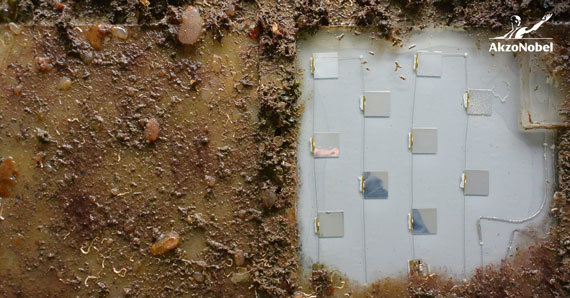More news
- PPG reports results for Q1, 2024
- FEICA 2024 open for registration
- Vattenfall and BASF sign purchase agreement for 49% of Germany’s Nordlicht offshore wind...
- AkzoNobel delivers continued volume growth and margin expansion in both Paints and Coating...
- PPG appoints Pascal Tisseyre as Vice President, government affairs, Europe, Middle East an...

AkzoNobel is to develop a revolutionary fouling prevention technology that uses ultraviolet light-emitting diodes (UV-LED).
The pioneering solution, which uses underlying technology developed by Royal Philips, will be applied to underwater surfaces to eliminate fouling growth.
By combining AkzoNobel’s surface protection and adhesion know-how with Royal Philips’ capabilities and intellectual property in UV-LED lighting and electronics, the two companies are aiming to develop an economically viable solution for underwater fouling prevention.
The innovation will integrate UV light-emitting diodes in a protective coating scheme that will allow for the UV light to be emitted from the coating surface, providing the total prevention of biofouling accumulation on the surface of the protected area.
The fully biocide-free solution will provide groundbreaking performance and offer complete fouling prevention to the hulls of ships and boats.
The total control of biofouling represents a substantial economic and environmental benefit, and when realised the impact of this new technology on vessel owners and operators will be hugely significant.
"In our Sustainable Fouling Control initiative, we actively explore and develop alternatives to biocidal-based solutions," said Oscar Wezenbeek, Director of AkzoNobel Marine and Protective Coatings.
"This development is a great proof point of our continuous focus on delivering eco-friendly solutions to our customers."
AkzoNobel has long been a frontrunner in developing sustainable marine coatings, having introduced the industry’s first biocide-free antifouling coating, Intersleek, in 1996.
The product – a true revolution at the time – presented AkzoNobel with huge development challenges, which they were able to tackle.
Intersleek has since helped ship owners to save over US$3bn of fuel and 32Mt of CO2 and it continues to play a leading role in the company’s commitment to making shipping more sustainable.
Despite the complexity of this project, AkzoNobel is again confident they will be overcome and ultimately expects the technology to completely revolutionise the fouling control industry.
Initially, the focus will be on applications for ships, yachts and offshore assets but the project could potentially be extended to include other surfaces challenged by bio-fouling issues.
"This unique project is fully aligned with AkzoNobel’s continuous focus on innovation," explained Klaas Kruithof, AkzoNobel’s Chief Technology Officer.
"In our quest to not only protect and colour but also functionalise surfaces, we actively look for complementary technologies and partners to innovate with.
"In this case, the combined capabilities and technology of Royal Philips and AkzoNobel will enable us to accelerate the realisation of this transformative innovation, which we intend to initially market ourselves and consider licensing out to third parties for large-scale adoption."



